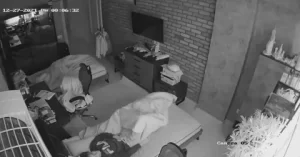Extreme inflammation of her brain and spinal cord was ruining her life and as a result of her condition, she became paralyzed from the waist down. Over time she completely lost the ability to speak. Then she slips into a coma, however her inspiring stories did not end here. What happened four years later shocked not only her family but physicians, too.

Victoria was kept alive with a feeding tube. Although her parents were told that it was unlikely she would recover, Victoria could hear her loved ones. When Victoria first “woke up” mentally, she was unable to move her body. She could hear conversations around her and wanted to react, but her body would not obey her commands. Victoria had no way of telling people what was happening to her.
She was “locked” inside her own body, where she would remain a prisoner for years. As if someone had flipped a switch, she could not control her body, but she was there, listening. Unable to respond, she heard doctors tell her family that she was effectively brain dead and would be a vegetable for the rest of her life. They were wrong, and shockingly, no one can tell you that better than Victoria herself.
“But my parents believed in me. They set up a hospital room in our house in New Hampshire and took care of me. My three brothers — I’m a triplet and we have an older brother — talked to me and kept me in the know about what was going on outside of my room. They empowered me to fight and get stronger. They didn’t know I could hear them, but I could,” Victoria said, according to ESPN.
Nearly four years after slipping into a coma, Victoria was completely out of her vegetative state. Her remarkable recovery began after she was finally able to make eye contact with her mother and blink on command. Then, she was able to move a finger, which progressed to waving her hand, as she slowly regained control of her body. She even began eating. Eventually, she began to talk again, first forming single words, then full sentences.

Despite her incredible recovery, there was still one thing she couldn’t do. Victoria was told that the swelling to her brain and spinal cord had caused permanent damage, paralyzing her from the waist down forever. She couldn’t move her legs, and specialists continuously told her to get used to being in a wheelchair.
Once again, Victoria proved she had the willpower few others could even imagine as she fought to overcome impossible odds, but it wasn’t easy. She faced struggles and even bullying as she returned to school. Just like before, however, Victoria found the turning point she needed.

“We realized this was the place that could help me, but we didn’t want to live hundreds of miles away from my brothers and dad,” Victoria explained before revealing that her “family decided to open the first Project Walk franchise on the East Coast.” She furthered, “This way, I could train every day and achieve my goal, while others in my hometown could regain the hope they needed.”Even though specialists remained skeptical and one doctor even told her parents that he wouldn’t “mortgage his house” to bet that Victoria would ever be able to walk again, that’s exactly what they did in order to afford to open a Project Walk Boston. Then, held in a harness above a treadmill with two coaches helping her move her legs, Victoria took her first small steps six years after she first “woke up.”
It was no easy feat, but she didn’t stop there. She got up and trained for hours every single day to reach her goal. Because of her determination, she was eventually able to walk with crutches, later ditching the assistive devices and walking independently. “Walking is still challenging and I still have significant impairment,” she explained. “But my struggle is now less visible.”






